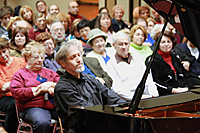When people with successful careers hit 60, they often take stock of what they’ve done, make some decisions on how they might spend their so-called golden years, and perhaps figure out a way to leave their legacy.
Not Moshe Cotel.
Instead, this lifelong musician, composer and professor of music dropped everything and went to rabbinical school.
“I left because I felt called to the rabbinate,” said Cotel. “I thought, back in 2000, when I took early retirement, that I had left my life as a musician, and I would spend the rest of my years as a rabbi. Now it turns out that perhaps what God had in mind is that I would not be a rabbi, I would get the background I needed to compose these programs.”
For his senior thesis at the Academy for Jewish Religion in New York, Cotel, stymied on how to proceed, asked whether he could intertwine his sermon with music. From that, “Chronicles: A Religious Life at the Classical Piano,” a discussion of Biblical texts joined with the music of composers as varied as Bach, Mozart and Gershwin, was born.
Cotel will perform “Chronicles” for an intimate audience at the Youngstown Cultural Center in West Seattle on June 15. He comes to town as a guest of the Jewish Education Council of the Jewish Federation of Greater Seattle.
One Midrash in Cotel’s performance centers around the putting on of tefillin, which observant men wrap around their left arm and hand when they pray each morning. He narrates to the music of the innovative Russian composer Alexander Scriabin, who had permanently injured his right hand while attempting to play a Franz Liszt opera.
“He wrote some exquisite pieces for the left hand,” Cotel said, and uses the example as “how someone succeeded, besides his handicap.
“I use these rabbinic vignettes, illustrated by virtuoso piano pieces, to show people how to deal with despair and how to overcome handicaps, and how to open up to self-transcendence.”
Cotel performs two dozen times a year, while also serving as a pulpit rabbi at a Conservative congregation in Brooklyn, N.Y. Ironically, the synagogue’s cantor takes over running services when the rabbi’s on the road.
“My congregation is several hundred members, and that helps, because if it were larger it would be impossible for me to do this,” he said. “They’re very understanding of my need to teach Torah through classical music.”
Cotel’s decision to leave his 28-year tenure at the Peabody Conservatory of Music at Johns Hopkins University, and, he thought, his lifelong musical career (he wrote a symphony right after he became a Bar Mitzvah), came as something of an “a-ha” moment.
“When I made this switch to go to rabbinical school, I was at the top of my game. I had spent five years composing a, frankly, Zionist opera, on the Dreyfus affair,” he said, “one of my major undertakings as a composer.”
The opera was performed first in Brooklyn and then in Germany to what he said was great acclaim, then was scheduled for the following season in Vienna.
“The German conductor — they wanted to do it fast, they wanted to do it the very next season — he was already booked for next year,” Cotel said. So they asked him to do it himself.
Cotel’s German, however, was not so good, and the language class he enrolled in was cancelled due to lack of interest. The language school suggested that he get in touch with the teacher, who lived across the street from his synagogue, for private lessons.
“It was an elderly German widow,” Cotel said. “The lessons consisted of my telling her in my execrable German the story of my opera, and what I was trying to accomplish with this and the…Zionist orientation.”
The lessons were successful and he conducted the opera without a problem.
“I came back and resumed my life as a musician here, and a few months later, I was walking up to synagogue on Saturday morning,” he said, when “I heard a voice call from behind me: “˜Ma shlomcha’” — a common Hebrew greeting.
“I stopped dead in my tracks,” he said. “It was the voice of that German teacher from the previous summer.”
She had been born Jewish, but had hidden her religion for most of her life. It was only in her old age that she had come back to it, and it was because of the summer she had spent with Cotel, she told him.
“My life changed right there,” he said. “Something came down into my head. I had to become a rabbi.”
With the marriage of composer and rabbi, Cotel now criss-crosses the country to perform “Chronicles,” and a newer program, “Chronicles II,” which includes some of Cotel’s own compositions. These performances take place not only in synagogues, but in churches and for interfaith groups as well.
“Many rabbis have used the vehicle of building bridges to their Christian colleagues,” he said, and “sometimes they get invitations from Christian congregations.
When he comes to Seattle this month, a contingent of Scientologists has been invited to the performance, a new experience for Cotel.
“What’s become clear to me from these tours is [that] the whole world is my temple. So I’m thrilled to play for synagogues all over the country, and I’m especially thrilled to play for Christians, and Scientologists, and any spiritual seeker seeking to reach this level of transcendence,” he said. “The Torah gives us such tools and the Torah is open to everyone. It’s not just Jews.”
Putting the Torah to music
